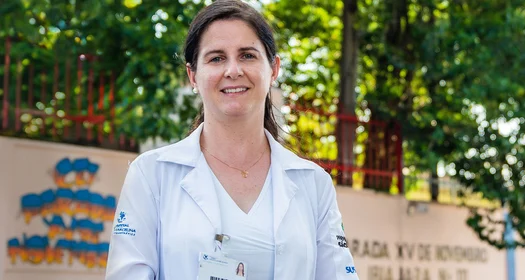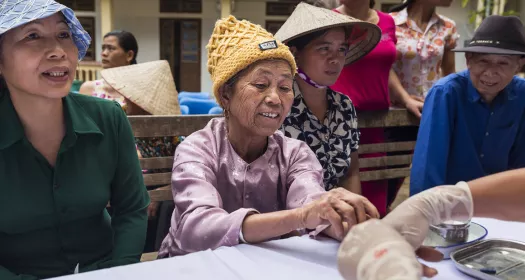- COVID-19 pandemic triggered massive surge in virtual health and care delivery across the world, with many countries embracing hybrid virtual and in-person services
- Report from the Broadband Commission for Sustainable Development Working Group on Virtual Health and Care – co-chaired by the World Health Organization and the Novartis Foundation – provides learnings from 23 countries
- Report calls on health decision makers to act to prevent digital divides from increasing health inequities: countries need to implement clear policies that ensure equitable and inclusive access to virtual services for entire populations
Basel, June 16, 2022 — Many unnecessary restrictions on virtual health and care were swept away by the pandemic, and most people have embraced this new world of virtual care, according to a new report from a Broadband Commission for Sustainable Development working group. The Future of Health and Care – driving access and equity through inclusive policies details how the past two years have changed access to health and care in 23 countries as diverse as Rwanda, Singapore and the United States.
Virtual health solutions are those that seek to keep people healthy; care solutions treat those who are already sick. The use of both surged during the pandemic. In the U.S., the percentage of telehealth claims out of all health claims was 25 times higher in January 2022 compared to October 2019. In India, the numbers of synchronous teleconsultations on the national teleconsultation and e-outpatient service e-Sanjeevani were four times higher in February 2022 than in October 2020.
“In the past two years, I have seen transformations in health and care delivery that I thought would take at least a decade,” said WHO Director-General Dr Tedros Adhanom Ghebreyesus, who co-chaired the Working Group on Virtual Health and Care, which developed the report. “We have seen that decision makers are now embracing hybrid health systems that combine virtual and in person services. This is an incredible advance in healthcare, one that was long overdue and now happened at an accelerated pace due to the pandemic. But countries need to introduce careful policies to ensure their entire populations can benefit from these changes.”
The use of virtual health and care is popular: surveys conducted in the U.S. in 2021 show that over three-quarters of patients want virtual services to be a continuing part of their care, and that over 80% of providers intend to continue using virtual health after the COVID-19 pandemic has eased. But many countries have not yet developed coherent frameworks to ensure virtual health services work effectively alongside in-person care.
The report includes an analysis of virtual health and care policies in 23 countries. These insights form the foundation for a comprehensive roadmap that provides practical actions to help countries ensure virtual health and care drives health access and equity. Policymakers need to make sure their health systems are fully integrating virtual services, to support inclusive and equitable access for all.
“As we emerge from the pandemic, there is a clear momentum for policymakers around the globe to build on to further digitize health and care delivery,” said Dr Ann Aerts of the Novartis Foundation and Working Group Co-Chair. “To ensure this roll out is done in a way that builds equitable access to health and care, it is essential to combine virtual and in person health service delivery. As some population groups may have less access to mobile phones and internet, or lower levels of digital literacy, countries have to ensure inclusive and equitable policy making to further integrate virtual services into their overall health systems. People who need help to access or navigate virtual health services for example, require targeted attention.”
The report notes that for some groups, internet access can be an issue, although this is changing rapidly. Data security and patient privacy are other areas that need attention from policymakers.
“For people to benefit from virtual health and care, equal access to digital connectivity is essential. Worldwide, women have less access than men,” said Ms Doreen Bogdan-Martin, Executive Director of the Broadband Commission and Director of the ITU Telecommunication Development Bureau. “The latest ITU data clearly illustrates that the gender digital divide in internet use remains wide, and is most persistent in the least developed countries, where only 19% of women use the internet. We must continue to work together to ensure that access to digital health is universal.”
About the Novartis Foundation
The Novartis Foundation is a non-profit organization based in Switzerland. For over 40 years, we have helped improve the health of low-income populations, initially supporting disease elimination in areas such as leprosy and malaria. Today, we tackle the burning issues of our time, cardiovascular diseases and health inequity. We take a population health approach, which means bringing together existing but disconnected data to help authorities understand the root causes of unequal health outcomes, and define the best ways and best partners to remediate those. This empowers governments to transform their health systems from being reactive to proactive, predictive and preventative, and achieve health equity among the populations they serve.
The Novartis Foundation is on Twitter at @NovartisFDN
About the Broadband Commission for Sustainable Development
Since 2010, The ITU/UNESCO Broadband Commission for Sustainable Development has leveraged the strength of its cross-sectoral membership and collective expertise to advocate for meaningful, universal connectivity. This report is the fourth in a series published by the Commission’s Working Groups on health, which aim to define how data, AI and digital health can contribute to the realization of the health-related Sustainable Development Goals. The current Working Group on Virtual Health and Care is co-chaired by the World Health Organization and the Novartis Foundation and has more than 35 world experts in ICT and health as members. The report was developed with support from Accenture.
Contact:
Novartis Foundation Media Relations
Carolyn Canham
Tel: +41 79 334 4325
Email: [email protected]





